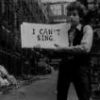 1
1assume, that the statement holds true., then it holds true for all natural numbers n>=2
so we have,
1-\frac{1}{2}+\frac{1}{3}-\frac{1}{4}...\frac{(-1)^{n-1}}{n}=I_{1}
and also
1-\frac{1}{2}+\frac{1}{3}-\frac{1}{4}...\frac{(-1)^{n-1}}{n}+\frac{(-1)^{n}}{n+1}=I_{2}
so I2-I1 =\frac{(-1)^{n}}{n+1}
which is not an integer,
so contradiction,
cheers!!
 341
341Actually, he wants you to prove that for no n this sum is an integer. So this proof is invalid.
Hint: The usual way is to look at the highest power of 2 that appears between 1 and n. See if you can take it from here
 11
11If n is odd, n=2a+1, then,
1-12>0, now I add a number, and subtract a smaller number, this process continues proving that the sum is positive....
Also
12n>12n+1
Thus
-12+13-14+....+12n+1<0
Adding 1, to both sides we get the 0<S<1, thus it's not an integer....
ii) When 'n' is even, n=2n+2,
1>12
13>14
....
12n+1>12n+2
Thus 0<S<1, again as before, hence it is not an integer....